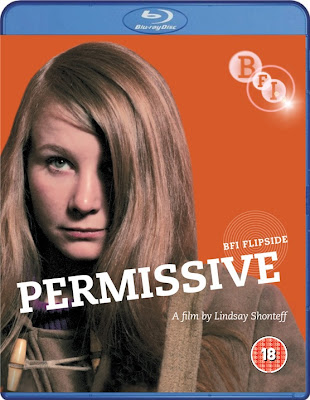Shonteff is, along with the likes of Stanley Long, Pete Walker and Arnold Miller, part of a group of film makers who operated within the growing British sexploitation film industry of the late 60s and early 70s. Much of that industry represented the, albeit unselfconscious, nadir of the British film industry's output (the endless Confessions and Adventures Of... films raking in the cash despite or because of their low rent appeal) when transatlantic funding all but dried up and we saw the likes of Hammer, Amicus and other British independents and majors curl up and die. The British exploitation film persevered in this climate, primarily because of the continued presence of the Eady levy combined with a loosening of censorship rules, and much of the output was clumsy soft porn comedy and genre spoofs or sensational horror flicks.
It's part sexploitation flick, featuring the familiar figures of the Collinson Twins (see them in Hammer's Twins Of Evil as an example of how sexploitation was used to shore up the company's tired horror output in the 1970s) and various top models of the day, and, oddly, a less than effective promotional exercise for Forever More. The band was real, making several records for RCA, but, to be honest, the film does little for them or their music and seems to use the same three or four songs over and over again to blanket the soundtrack. Not only do they start to grate but they also drown out much of the dialogue. But perhaps that's the point as it's the tits, ass and fleeting glimpses of pubic hair or the rather obvious, and somewhat incongruous, lesbian seduction scene which takes place after Suzy has physically attacked Fiona to emphasise her dominance of the groupie coterie, that the cinema club audiences of yesteryear were interested in.
Despite these rather torrid roots, the film is a seedy, searingly claustrophobic examination of the times, showing us a London that's drab, grey and bleak and, from the windows of the tour bus, a brooding, anonymous winter landscape redolent of hopelessness. Shonteff edits the film with a certain amount of experimental flair, dropping in flashcuts to the deaths of Pogo and Fiona early on, suggesting a foretelling of the narrative's end, preparing you for what will turn out to be a numbing, alienating experience. Shonteff's film benefits reasonably well from its release on Blu Ray but it's not as good as some of the BFI's other transfers such as the Arnold Miller films, Man Of Violence or That Kind Of Girl. It's a clean, virtually spotless transfer and reds and yellows are vivid amongst the drab greys and greens of the outside world and the browns and beiges of endless hotel rooms. Skin tones are very natural looking. The film is presented with much grain in a naturalistic style using the available light by the looks of the presentation. Sharpness of detail surfaces occasionally, particularly in a number of closeups, from the clammy visuals and overall its quite a soft but perfectly serviceable picture. Probably the best it's ever looked.
The soundtrack is dominated by the interminable loop of Forever More's songs and the soundtrack by cult acid folk and prog rock legends Comus. Dialogue is often muffled and sometimes the songs obscure any lines of importance. However, these are qualities that add a rough stylishness to the film, deepening the claustrophobic and alienating atmosphere of the piece. Overall, whilst it's qualities as a sexploitation vehicle are hardly worth the price of of a cup of tea these days, there is a cynical and impassive critique of the fag-end of 1960s counter-culture here that's rather more true to life than, let's say, the overt kitschy romanticism of same in a film like Cameron Crowe's Almost Famous. A fascinating curio of British exploitation cinema.
Special features:
- Original Permissive trailer
- Bread (Stanley Long, 1971, 68 mins): whilst hitch-hiking back from the Isle of Wight Festival, a group of friends decide to stage their own music event. But how will they afford it?
- Bread – mute deleted scenes
- ’Ave You Got a Male Assistant Please Miss? (1973, 4 mins) a humorous film in which a permissive couple are given some useful advice.
- Extensive illustrated booklet with contributions by I Q Hunter and rock singer Lee Dorrian, and Comus band-members’ recollections of working with Lindsay Shonteff

















Post a Comment